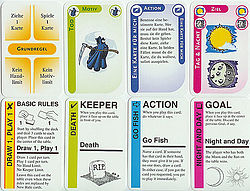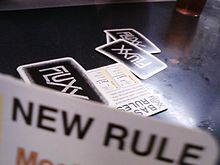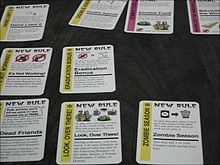Fluxx

Comparison of cards from English and German versions.
|
| Manufacturer(s) |
DeLano Services (most)
360 Manufacturing (mass market) |
| Players |
2-6 |
| Age range |
8 and up |
| Playing time |
20 minutes on average, varying greatly |
| Random chance |
High |
Fluxx is a card game, played with a specially designed deck published by Looney Labs. It is different from most other card games, in that the rules and the conditions for winning are altered throughout the game, via cards played by the players.
History
Fluxx was created by Andrew Looney on July 24, 1996 as the first game for his and his wife's part-time game design company, Looney Laboratory. The original print run was for 5,000 units and was released in 1997.
The game was successful and was licensed a year later to Iron Crown Enterprises (ICE) for wider distribution. ICE went bankrupt two years later and Looney Labs has resumed publication and distribution. By March 2001, Labs was considering putting out another standalone deck version called Fluxx++ using card created by the Fluxx playing community with Fluxx Blanxx and Fluxx: Goals Galore, an expansion consisting total of goal cards, based on its Origins 2000 5 Goal cards promo pack. Labs placed Fluxx Lite, a slimmed down 56 card deck to lower the price for discount superstore, in design by March 2002.
Amigo Games, a German game company, licensed and published a German language version of Fluxx in 2003. The in design Fluxx Reduxx was indefinitely place on hold as of July 14, 2005 to focus on EcoFluxx. Labs registered the Fluxx trademark. By October 2005, Stoner Fluxx had been released and EcoFluxx was in play testing, but scheduled to be released later that month followed by Family Fluxx.
In November 2006, Looney Labs issued a Spanish language edition. The October 10, 2007 release of Zombie themed version brought the first new card types, Creeper and Ungoal. A Toy Vault co-published Monthy Python Fluxx was released in 2008. Fluxx edition 4 was released in December 2008 was the first set to have the Meta Rule subtype card, which stemmed from a Fluxx Tournament rule.
In 2008, Zombie Fluxx won the Origins Award for Traditional Card Game of the Year. On November 13, 2009, Labs launched its Full Baked Ideas imprint with a new edition of Stoner Fluxx and expectations for a drinking variant of Fluxx.
Two variants were re-released on March 5, 2010, Eco and Family, with Eco being a new edition. In February 2011, the Surprise type of cards are introduced in the Pirate Fluxx themed variant. In March 2011, the German language version 2nd edition was released by Pegasus Games. By May 2011 over 1 million decks of all Fluxx versions have been sold while Pirate Fluxx was getting into bookstores that month.
On August 1, 2012, Looney Labs get a simplified less expensive general market version with redesigned packaging of Fluxx into Target stores. For the Summer 2012, Fluxx was number 10 in ICv2's Top 10 Card/Building Games (hobby channel). Stoner Fluxx was placed back in print under the Full Baked Ideas imprint of Looney Labs on November 13, 2009 after being out of print for four years. Full Baked was launched with expectation of a future release of a drinking variant and other mature subject versions.
Cartoon Network version was available as a Target exclusive from mid-August 2014 until Easter 2015, while in July the Regular Show Fluxx was released to the hobby market. The fifth edition of the regular game was available beginning in 2014 as the 4.0 edition run out with Looney Labs teaming up with The Doubleclicks for a Fluxx theme song. A new expansion, Fluxx Dice, and two licensed variants are scheduled to be released in the summer of 2015.
Game description and play
The first edition deck consists of 84 cards with four types of cards, Keepers, Goals, Actions, and New Rules. Starting with a simple draw a card then play a card, the game mutates when a New Rule card is played. They may change the number of cards drawn or played per turn or the number of cards in your hand or the Keepers played. The Goal cards change the Keepers need to win the game. Later sets some times included Creeper cards that block or make goals more difficult to obtain. Ungoal cards have conditions were the game ends with no one winning the game. Surprise Cards, a 2011 addition, allow players to negate other types of cards which could stop a victory, and can be played at any time. These cards have other results when played on your own turn.
The first Fluxx tournament at Origins 1997 had an extra rule calling for an increase in the Basic Rules each time the deck is reshuffled which was kept for future tournaments. On August 28, 2008 via their Wunderland blog, Looney introduced the "Meta Rule" type cards for players to self print as a method to incorporated this within the standard decks and place in the primary deck Edition 4.0.
Early edition decks had 84 cards while newer standard decks have 100 cards, while Lite versions (Family, Spanish, SE) consist of 56 cards.
Card sets
Editions

Fluxx 3.1 cards look similar to earlier versions.
- Fluxx 1.0 (1997) first released version; monochrome, poker-sized cards
- Fluxx 2.0 (1998) published by Iron Crown Enterprises; new card layout, use of color, bridge-sized cards
- Fluxx 2.1 (2002) reprint of 2.0 with minor changes
- Fluxx 3.0 (many cards removed and added, to improve balance) manufactured by Cartamundi
- Fluxx 3.1 (2012) new style Basic Rule card, two cards removed, one card added; manufactured by Cartamundi
- Fluxx 4.0 (December 2008) card number increased to 100, all color, introduction of Meta rule in any set and creepers in primary editions
- Fluxx SE (August 1, 2012) a Target Stores exclusive "basic entry" edition of the game, with simplified rules and exclusive cards, manufactured by 360 Manufacturing
- Fluxx 5.0 (2014) removal of all creepers and several other cards, 17 total, replaced by new Goals, Actions, and New Rules cards
Languages
- Flux Spanish (Fluxx Español!; November 2006) Looney Labs, a 56 card set with 6 new Goals, a new Keeper and a new Rule
- German Fluxx first edition (2003; based on 3.0 card set) by Amigo Games
- Second edition (March 2011; based on 4.0 card set) Pegasus Games
- Japanese Fluxx (based on 3.0 card set) HobbyJapan
- Dutch Fluxx (based on 3.0 card set) PS Games
- Portuguese EcoFluxx, released in Brazil
Expansions
Several expansions have been produced, including:
- Flowers and Fluxx (a gift set with a "bouquet" of six plush "Happy Flowers", a Fluxx 3.0 deck and an exclusive "Flowers" promo Keeper card)
- Fluxx Blanxx, a set of blank cards for creating one's own custom additions (see above).
- 2nd edition - begins formatted fronts while including the Chrononauts Beatles Reunion CD card
- 3rd edition - adds Creeper blanks while removing the Chrononauts card
- Jewish Fluxx
- Christian Fluxx
- Castle Expansion Cards (May 2009 for Monty Python Fluxx
- 7 Cards From the Future (a 7-card set for Regular Show Fluxx)
- International Tabletop Day Expansion: Wil Wheaton and Felicia Day Fluxx Promo Packs (April 11, 2015)
- Fluxx Dice (August 2015)
- Goal Foundry Pack (October 2015)
Variants

Zombie Fluxx cards in play, including New Rules (yellow) and Goals (pink).
There are also versions of Fluxx that have been released using entirely different themed sets of cards while playing by the same set of rules.
- Stoner Fluxx
- 1st edition (Released by October 2005 and out of print in 2005)
- 2nd Edition, Fully Baked Ideas imprint (November 13, 2009) with 5% of proceeds going to end marijuana prohibition groups; 100 cards
- EcoFluxx, a percentage of profits goes toward environmental causes
- First edition (October 2005) Allison Frane art 84 cards
- Second edition (March 5, 2010) added additional cards including Creeper cards and has new art; 100 cards
- Family Fluxx (November 2005) initially designated as Fluxx Lite then Fluxx Jr. before being released, is a full-color "family friendly" 56 card edition, with family bonuses, re-released on March 5, 2010, currently (by July 2015) out of print
- Zombie Fluxx (2007) 2008 Origins Award for Traditional Card Game of the Year, introduced the Creeper type card, 100 cards
- Monty Python Fluxx (October 2008) co-published with Monty Python licensee, Toy Vault; 100 cards with Todd Cameron Hamilton art
- Martian Fluxx (September 25, 2009) (By July 2015) currently out of print.
- Pirate Fluxx (February 11, 2011) introduces the Surprise cards
- Star Fluxx (September 30, 2011)
- Oz Fluxx(March 23, 2012)
- Cthulhu Fluxx (August 2012)
- Fluxx the Boardgame (2013) Parents' Choice Recommended Seal Fall 2013 Games
- Monster Fluxx (Fall 2013) also a Target Stores exclusive, manufactured by 360 Manufacturing
- Regular Show Fluxx (July 25, 2014) 100 cards
- Cartoon Network Fluxx (mid-August 2014) also a Target Stores exclusive
- Holiday Fluxx (October 3, 2014) 100 cards with art by Ali Douglass
- Adventure Time Fluxx (July 2015)
- Batman Fluxx (August 2015) with Cryptozoic Entertainment
Many of the version can be combined with each other to make a "mega Fluxx" deck (as all these versions have the same card back style).
Board Game
Flux: The Board Game
| Publication date |
August 2013 |
| Players |
2-4 |
| Age range |
8 & up |
| Playing time |
15 to 30 minutes |
The Flux: The Board Game' is a board game implementation of the card game released by August 2013. This game was awarded the Parents' Choice Recommended Seal Fall 2013 for Games.
The game moves the Keeper card items to spaces on the board while adding the "Leaper" card type. The board is separated into 9 movable tiles with four spaces each except for the start tile with the initial set up of 3x3 square. Besides the Keeper spaces there are 1 octagon space per title and two teleport spaces for the whole board. Moving on to one teleport space allows the player to move to the other teleport space. The octagon may hold any number of pawns while the keeper spaces can only have one with an incoming pawn pushing out the current pawn. There are two peg boards that track, the number of goals needed to win and current rules.
All start with a hand of three cards and a color card in face up to indicate the pawns they control. The each get to make a free rule change. New general rules effecting the tiles include rotation, moving and allowing wraparound tile movement. The game only has Action, Goals, New Rules and Leaper type cards. Action cards can change force a change in player color. A Leaper card counts as a card play but allows you to move a pawn to the item on the board. Goals cards are stacked near the board with top most card the current goal.
Promotional cards
Looney Labs gives away promotional cards related to Fluxx at conventions such as Gen Con and Origins. They have given away cards such as Composting and Jackpot, which later appeared in EcoFluxx and Family Fluxx respectively. They have also given away promo cards for Christmas to members of their online mailing list and in High Times magazine. Game Technicians (previously known as Mad Lab Rabbits), voluntary game demonstrators for Looney Labs, give away promo cards to people interested in the game.
- Origins 2000 Goal promo 5 card pack.
- Sir Not Appearing In This Game! (May 2009) for Monty Python Fluxx & its Castle expansion
- Traitor, a Creeper promo card June 2009) issued for the release of another Looney game, Are You The Traitor?
- Wizard of Oz song promotional card
- "Mrs. Claus" promotional card in Holiday Fluxx store launch kit
- "Skullduggery" promo card (February 11, 2011) Pirate store launch kit
Online
Fluxx was available to play for free via the volity network and was also available to be played online via the CCG Workshop, using the gatlingEngine to adjudicate most of its rules automatically. However, both Volity.net and CCG Workshop are no longer operating.
In December 2012, Fluxx was released by Playdek as an app on iOS operating systems (iPhone, iPad, iPod Touch, Apple TV) by purchasing it from the Apple App Store. It uses the "mass market" deck developed for Target Stores, removing some of the more esoteric themes (such as Cthulhu) and complex rule cards.
Reception
The base game won the Mensa Select Game Award in 1999. Rick Loomis comments: "Fluxx makes a good game for a group that has one of those annoying "I-must-win-every-game" types. The rest of you can enjoy yourselves as the game spins out of his control (as it surely will) and perhaps he'll eventually learn to lose gracefully. Meanwhile, Fluxx will be busily exercising everyone's logic synapses as you attempt to deal with the chaotic situations that occur because of the cheerful clash of rules."
Read more:
COMMENTS









 Fluxx 3.1 cards look similar to earlier versions.
Fluxx 3.1 cards look similar to earlier versions. Zombie Fluxx cards in play, including New Rules (yellow) and Goals (pink).
Zombie Fluxx cards in play, including New Rules (yellow) and Goals (pink).